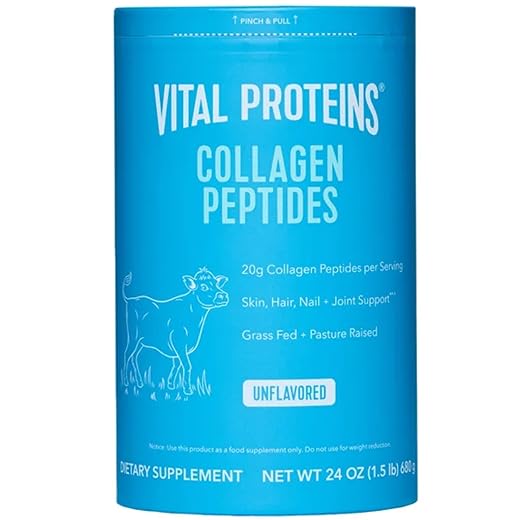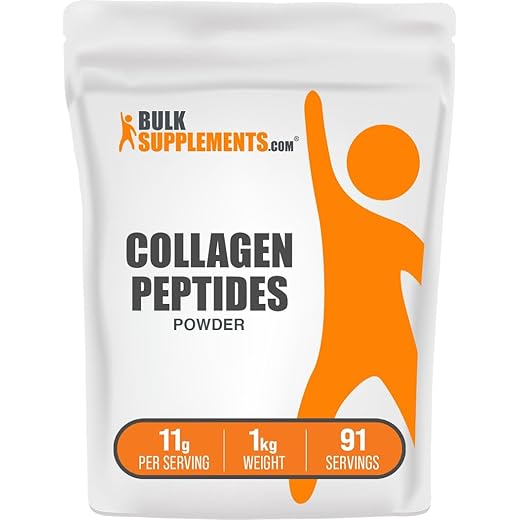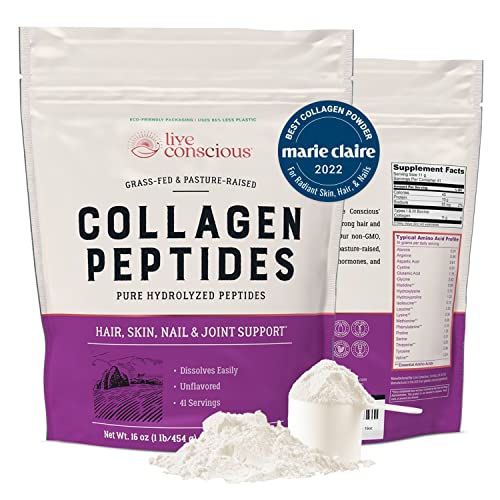Welcome to our blog post where we address the common concern: “Are Collagen Peptides Vegan-Friendly?” We understand the importance of making informed choices that align with your values and dietary preferences. Join us as we navigate through the world of collagen supplements and explore plant-based alternatives for a more conscious approach to self-care.
Top-Rated Collagen Peptides for Radiant Skin and Joint Health



What are Collagen Peptides?
Collagen peptides have gained immense popularity in the health and beauty industry due to their numerous benefits for skin, hair, joints, and overall well-being. In this blog section, we will delve into the basics of collagen peptides, exploring their sources, benefits, and common uses.
What are Collagen Peptides?
Collagen is the most abundant protein in the human body, providing structure to skin, bones, muscles, and other connective tissues. Collagen peptides, also known as hydrolyzed collagen or collagen hydrolysate, are derived from collagen through a process of breaking down the protein into smaller chains of amino acids. This makes collagen peptides easier for the body to absorb and utilize.
Sources of Collagen Peptides
Collagen peptides can be sourced from various animal proteins, including bovine (cattle), porcine (pigs), poultry (chicken), and marine (fish) collagen. Each source may offer slightly different types of collagen and amino acid profiles, catering to different preferences and dietary restrictions.
Benefits of Collagen Peptides
- Skin Health: Collagen peptides can help improve skin elasticity, hydration, and overall appearance, reducing the signs of aging such as wrinkles and sagging.
- Joint Support: Collagen peptides may aid in relieving joint pain and stiffness by promoting the regeneration of cartilage and reducing inflammation.
- Hair and Nail Growth: Consuming collagen peptides can strengthen hair and nails, promoting growth and preventing breakage.
- Gut Health: Collagen peptides may support gut health by enhancing the integrity of the gut lining and improving digestion.
Common Uses in Health and Beauty
- Supplements: Collagen peptide supplements come in various forms such as powders, capsules, and liquids, making it convenient for daily consumption.
- Skincare: Many skincare products, including creams, serums, and masks, incorporate collagen peptides to enhance skin firmness and hydration.
- Functional Foods: Collagen peptides are often added to food products like protein bars, beverages, and snacks to boost their nutritional value.
Choosing the Right Collagen Peptides
When selecting collagen peptides, consider factors such as the source, purity, additional ingredients, and certifications. Look for products from reputable brands that provide transparent information about their sourcing and manufacturing processes. It’s advisable to opt for collagen peptides that are easily absorbable and free from unnecessary additives.
In conclusion, incorporating collagen peptides into your daily routine can offer a wide array of benefits for your health and beauty needs. Whether you’re looking to improve your skin’s appearance, support joint health, or enhance your overall well-being, collagen peptides may be a valuable addition to your lifestyle.
Understanding Collagen Peptides
Collagen peptides are short chains of amino acids derived from collagen, a protein that provides structure to your skin, bones, and connective tissues. Traditionally, collagen has been sourced from animal products like beef, fish, and chicken. However, with the rise of plant-based lifestyles, the demand for vegan alternatives to collagen has also increased.
The Myth of Vegan Collagen Peptides
Plant-Based Sources for Collagen Production
- Traditional collagen supplements are derived from animal bones, skins, and scales.
- The idea of plant-based collagen may seem like a contradiction due to the absence of collagen in plants.
Importance of Collagen for Vegans
- Collagen is crucial for skin elasticity, joint health, and overall well-being.
- Vegans may struggle to maintain optimal collagen levels due to dietary restrictions.
Vegan Alternatives to Collagen Peptides
Plant-Based Collagen Boosters
- Several brands offer vegan collagen boosters that stimulate the body’s own collagen production.
- Products like Garden of Life mykind Organics Organic Plant Collagen Builder contain plant-derived ingredients like silica, biotin, and antioxidants to support collagen synthesis.
Collagen-Boosting Nutrients
- Vegan supplements rich in vitamin C, zinc, and amino acids like glycine and proline can enhance collagen production.
- Sunwarrior Collagen Building Protein Peptides is a plant-based blend that provides essential nutrients for collagen synthesis.
Adaptogenic Herbs for Collagen Support
- Adaptogens like ashwagandha and schisandra help combat stress, which can degrade collagen.
- Moon Juice Beauty Shroom Exfoliating Acid Potion combines adaptogenic herbs with collagen-boosting ingredients for comprehensive skin support.
Plant-Based Collagen Boosters
In recent years, collagen has gained popularity for its role in promoting healthy skin, hair, and nails. While collagen supplements are commonly used to support collagen production in the body, there are also plant-based alternatives that offer similar benefits. These plant-based ingredients can help boost collagen production naturally, providing a cruelty-free and sustainable option for those looking to enhance their skin’s elasticity and firmness.
Why Choose Plant-Based Collagen Boosters?
Traditional collagen supplements are often derived from animal sources such as fish scales, cow hides, or chicken bones. For individuals following a vegan or vegetarian lifestyle, plant-based collagen boosters offer a compassionate choice that aligns with their values. Additionally, plant-based ingredients are rich in antioxidants, vitamins, and minerals that not only support collagen production but also contribute to overall skin health.
Top Plant-Based Collagen Boosters
1. Vitamin C
- Essential for collagen synthesis
- Found in citrus fruits, strawberries, bell peppers
- Supports skin elasticity and firmness
2. Glycine
- Amino acid crucial for collagen production
- Abundant in legumes, spinach, kale
- Helps repair and protect skin cells
3. Silica
- Mineral that supports collagen formation
- Present in oats, rice, bananas
- Improves skin texture and strength
4. Proline
- Amino acid that aids collagen synthesis
- Found in soy products, cabbage, asparagus
- Enhances skin hydration and elasticity
Benefits of Plant-Based Collagen Boosters
- Cruelty-free and sustainable option
- Rich in antioxidants and nutrients
- Supports overall skin health
- May improve skin elasticity and firmness
- Suitable for individuals with dietary restrictions
By incorporating plant-based collagen boosters into your diet, you can nourish your skin from within and promote natural collagen production. Whether through consuming these ingredients in their whole form or incorporating them into smoothies or meals, embracing plant-based options can offer a holistic approach to enhancing your skin’s health and appearance.
Factors to Consider When Choosing Vegan Collagen Peptides
When it comes to selecting the right vegan collagen peptides, there are several key factors to keep in mind to ensure you’re getting a high-quality product that meets your needs. From ingredient sourcing to product certifications and effectiveness, understanding these factors can help you make an informed decision. Let’s delve into each of these factors in detail:
Ingredient Sourcing
- Plant-Based Sources: Look for vegan collagen peptides derived from plant-based sources such as seaweed, fruits, or vegetables. Brands like Vegavero and Sunwarrior offer collagen supplements sourced from natural plant extracts.
- Organic Ingredients: Opt for products that use organic ingredients to ensure they are free from harmful pesticides and chemicals. Garden of Life and Amazing Grass are known for their organic vegan collagen formulations.
- Non-GMO: Ensure the product is non-GMO to avoid genetically modified organisms in your supplements. Brands like Garden of Life and Sunwarrior offer non-GMO collagen peptides.
Product Certifications
- Certified Vegan: Look for products that are certified vegan by reputable organizations such as the Vegan Society or PETA. Vega and Nuzest are examples of brands with certified vegan collagen peptides.
- Third-Party Testing: Choose products that undergo third-party testing to ensure quality and purity. Brands like MaryRuth Organics and Sunwarrior provide collagen supplements that are third-party tested.
- USDA Organic: If organic certification is important to you, seek products that are USDA certified organic. Garden of Life and Amazing Grass have vegan collagen peptides that are USDA organic certified.
Effectiveness
- Bioavailability: Consider the bioavailability of the collagen peptides, as this determines how well your body can absorb and utilize them. Brands like Sunwarrior and Garden of Life offer highly bioavailable vegan collagen peptides.
- Additional Nutrients: Some products may include added vitamins, minerals, or antioxidants to enhance the effectiveness of the collagen. Vega and Amazing Grass are known for their collagen supplements with added nutrients.
- Customer Reviews: Check customer reviews and testimonials to gauge the effectiveness of the product. Brands like Nuzest and Vegavero have positive reviews from satisfied customers regarding the effectiveness of their vegan collagen peptides.
By considering these factors—ingredient sourcing, product certifications, and effectiveness—you can make an informed choice when selecting vegan collagen peptides that align with your values and health goals.
Navigating the Plant-Based Collagen Landscape
In conclusion, individuals seeking vegan-friendly collagen alternatives have a variety of plant-based options to choose from based on their preferences and dietary needs. It’s important to consider the ingredients and sourcing of collagen peptides to ensure they align with your values and lifestyle. Ultimately, making an informed decision can help you incorporate collagen into your routine while staying true to your vegan lifestyle.
Collagen Peptides FAQ
Are collagen peptides derived from animals, making them unsuitable for a vegan diet?
Yes, collagen peptides are typically derived from animal sources such as beef, fish, or chicken. Therefore, they are not considered suitable for a vegan diet, which avoids all animal-derived products.
Are there plant-based alternatives to traditional animal-derived collagen peptides?
Yes, there are plant-based alternatives to traditional animal-derived collagen peptides. Some examples include collagen supplements derived from algae, fruits, and vegetables that are rich in amino acids and antioxidants that can help support collagen production in the body. These plant-based alternatives can provide similar benefits to animal-derived collagen peptides without using animal products.
Are there any additional benefits or drawbacks to choosing plant-based collagen peptides over animal-derived options?
Plant-based collagen peptides have some potential benefits over animal-derived options. They are suitable for vegetarians and vegans, as they do not involve the use of animal products. Plant-based collagen peptides also have a lower risk of containing contaminants that may be found in animal-derived collagen, such as hormones or antibiotics. Additionally, plant-based options may have a lower environmental impact compared to animal-derived collagen production.
However, there are also some drawbacks to choosing plant-based collagen peptides. Plant-based sources may not provide all the essential amino acids found in animal-derived collagen, which could potentially affect the overall effectiveness of the product. Plant-based collagen peptides may also be more expensive than animal-derived options due to the production process and sourcing of ingredients. Additionally, some people may find plant-based collagen peptides to have a different taste or texture compared to animal-derived options.
How effective are plant-based collagen alternatives compared to animal-derived collagen peptides?
There is limited scientific evidence to support the effectiveness of plant-based collagen alternatives compared to animal-derived collagen peptides. While some plant-based ingredients may promote collagen production or support skin health, they may not provide the same direct source of collagen protein as animal-derived collagen peptides. More research is needed to determine the comparative effectiveness of plant-based collagen alternatives in promoting collagen synthesis and overall skin health.
What are some common sources of plant-based collagen peptides?
Plant-based collagen peptides can be sourced from ingredients such as algae, fruits, vegetables, and seeds. Some common sources include spirulina, chlorella, citrus fruits, red fruits like berries, leafy greens, avocados, and seeds like chia and flaxseeds. These plant-based sources are rich in amino acids that can help support collagen production in the body.
What are collagen peptides and how are they typically sourced?
Collagen peptides are short chains of amino acids extracted from collagen proteins. They are typically sourced from animal connective tissues, such as bones, skin, and cartilage. The most common sources of collagen peptides include bovine (cow), porcine (pig), and marine (fish) sources. The collagen is broken down into peptides through a process called hydrolysis, which involves breaking the bonds between the amino acids to create smaller molecules that are more easily absorbed by the body.
Are plant-based collagen peptides as readily available as animal-derived collagen peptides?
Plant-based collagen peptides are not as readily available as animal-derived collagen peptides. This is because most collagen peptides on the market are derived from animals, such as cows, pigs, or fish. Plant-based collagen alternatives are still emerging and may not be as widely accessible as animal-derived options.




Leave a Reply